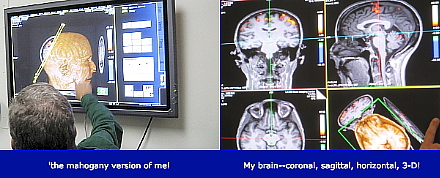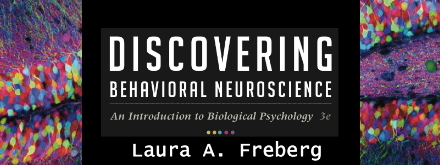
Having one’s own brain scanned for the students requires a certain level of bravery. What if they saw a hamster running in a wheel?
Here is what I am reading today:
“When you listen to music, multiple areas of your brain become engaged and active.
But when you actually play an instrument, that activity becomes more like a full-body brain workout. What’s going on?
Anita Collins explains the fireworks that go off in musicians’ brains when they play, and examines some of the long-term positive effects of this mental workout.”
“Willem Eijzenga, of The Netherlands Cancer Institute in Amsterdam, and colleagues evaluated the effect of a questionnaire in assessing psychosocial problems during cancer genetic counseling. All participants completed the questionnaire and were randomly assigned to either an intervention group (127 counselees), in which counselors received the results of the questionnaire before the session, or a control group (119 counsels).”
“Principal investigators and co-leaders of Tulane’s Circadian Cancer Biology Group, Steven Hill (left) and David Blask (right), and team members Robert Dauchy and Shulin Xiang.”
““We weren’t looking to explain anything about choice bias to start off with,” said lead author Jeffrey Cockburn, a graduate student in the research group of senior author Michael Frank, associate professor of cognitive, linguistic, and psychological sciences. “This just happened to be the behavioral phenomenon we thought would emerge out of this credit assignment model.””
“In interviews with 33 boys between the ages of 14 and 16, researchers found that most said they wanted a relationship with a girl for the closeness and trust. Very few boasted about sexual conquests or saw sex as a “main goal” in starting a relationship with a girl.
“In our culture, we have lots of assumptions about how guys behave,” said lead researcherDr. David Bell, of Columbia University Medical Center in New York City.”
“It’s a bit more complicated than scientists originally thought, according to a study recently published in the journal Neuroscience by ASU researcher Sabrina Segal.
When people experience a traumatic event, the body releases two major stress hormones: norepinephrine and cortisol. Norepinephrine boosts heart rate and controls the fight-or-flight response, commonly rising when individuals feel threatened or experience highly emotional reactions. It is chemically similar to the hormone epinephrine – better known as adrenaline.”
“The study, “Neural correlates of dueling affective reactions to win-win choices,” was published July 14 in the Proceedings of the National Academy of Sciences. Shenhav conducted the research as a graduate student at Harvard University, along with Professor of Psychology and Neuroscience Randy Buckner, the study’s senior author.”
“There were no differences in the genes that the children were born with, the study found; instead, the differences were seen in the extent to which the genes had been turned on or off. “This link between early life stress and changes in genes may uncover how early childhood experiences get under the skin and confer lifelong risk,” notes Seth D. Pollak, professor of psychology and pediatrics at the University of Wisconsin, Madison, who directed the study.”



0 Comments